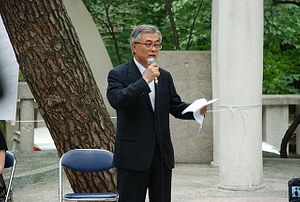South Korea’s main opposition party, New Politics Alliance for Democracy (NPAD), has decided to hold a convention in February to elect members to party leadership positions, including the party chairperson. NPAD is currently under the leadership of an interim chair (Moon Hee-sang), following the resignation of co-chairs Kim Han-gil and Ahn Cheol-soo. Given the electoral difficulties faced by NPAD as of late, the choice of new party chair will have significant implications for leftist party politics going forward. Perhaps more importantly, however, is the politics of intraparty factions that will play itself out between now and the date of the convention and will likely determine the composition of NPAD’s leadership.
Factionalism and the politics of party factions are not particular (or peculiar) to South Korea or NPAD (see, for example, my article on factional politics in the ruling Saenuri Party). Giovanni Sartori’s comparative work on party fractions (the general category) and factions (the sub-party power groups) suggests that looking at the subunits of political parties is a more informative and telling endeavor than the common practice of assuming the party as a cohesive whole. Taking heed of Sartori’s advice would be particularly useful in the study of South Korean party politics and domestic politics more generally.
Indeed, as those familiar with South Korean politics already know, charismatic individuals drive Korean politics (to a greater degree than other party systems). As it goes at the national level, so it goes within political parties. “Kyepagaldeung” (lit. factional struggle) is the phrase used by the South Korean press to describe party fragmentation and intraparty power struggles – something that occurs with more frequency and greater intensity within the liberal party.
How the forthcoming convention unfolds will be determined by who runs for the position of party chair. And who runs for the position of chair will determine how liberal party politics advances (or regresses). Of those heavy-hitters who are legitimate contenders for the party’s top spot, Moon Jae-in is the person to watch most closely.
Moon represents the (pro-)Roh faction. This faction, which was the basis of President Roh Moo-hyun’s political power, represents the old guard in many ways. Their brand of “progressive” politics is the type borne of political “struggle” in the 1970s and 1980s. While the ideology of struggle may have resonated with voters in the 1990s and early 2000s (especially the so-called 386 generation), recent elections suggest that voters have adopted more pragmatic positions and polling continually shows relatively weak support for NPAD.
Despite signs that voters’ preferences and interests are changing, surveys show that Moon still enjoys broad public support. And, as evidenced by his frequent media appearances and public profile, he still enjoys a significant level of intraparty support. There are, however, challengers. As a JTBC report on party factions describes, there is the pro-Roh faction, the “486 group,” and then the factions lead by Chung Sye-kyun, Park Won-soon, and Ahn Cheol-soo (although the Ahn faction, if it ever did exist, may have retreated to the background, along with Ahn himself). As always, factional struggle threatens to divide the party. As other reports suggest, the divide is likely to be between the pro-Roh and the others, namely Park Ji-won.
Whoever runs for the party’s top leadership spot will be a product of intraparty politics, a complex mess of wheeling, dealing, and politicking. And the candidate that ultimately takes that spot will determine the course the liberal party charts in the period before the next presidential election in 2017.

































